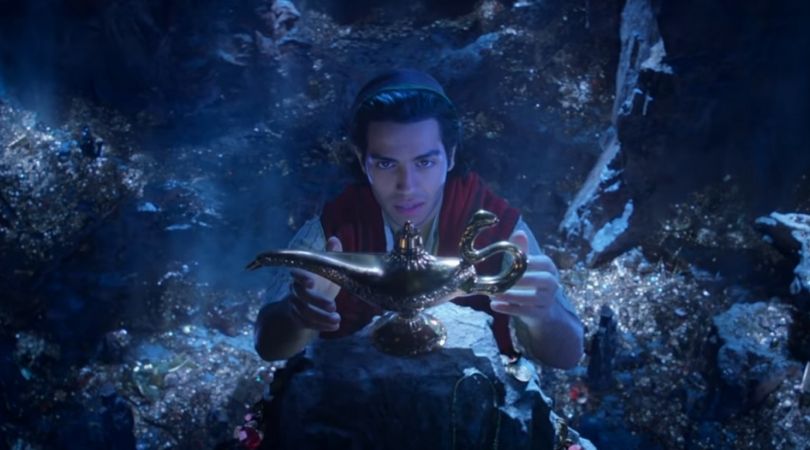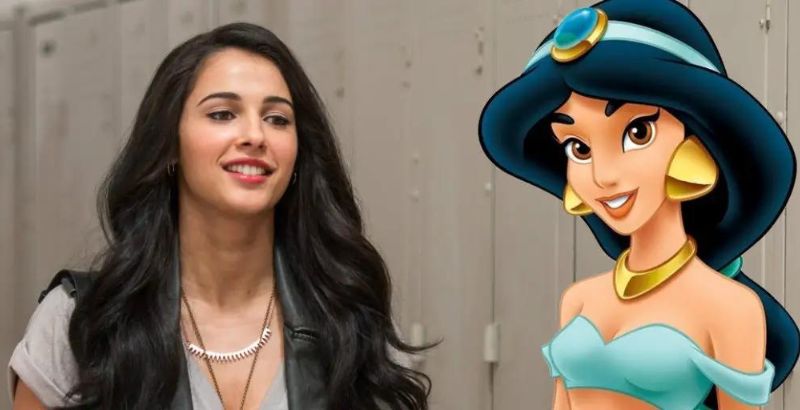
Live-action reboots/versions of animated properties are divisive, for many reasons. Big companies, particularly Disney, do them because they want to capitalize on the established value of a well-known property. In doing so, they use its historic fame for drawing a nostalgic audience. There’s little to no needed work to create new elements for a story. It’s just “what you loved as a kid, but LIVE!” On the flip side, these updated versions can expand on what we loved as kids, bringing in new story elements for a younger generation to enjoy alongside the animated versions. In particular, they can provide a good avenue for increased representation. However, having to rely heavily on reboots for representation has its own issues, as my friend Jess lays out in this excellent Twitter thread.
The upcoming Aladdin live-action highlights why we need to break out of “the status quo.” We need Arab, Iranian, Kurdish, Turkish, and other Middle Eastern peoples to be hired to create new stories in Western Media for positive and authentic representation. Aladdin is a film near and dear to my heart not only because of its amazing story, but in the visual representation, it gave me and so many other brown kids. However, relying on its confines as an Orientalist fantasy, from white creators Ron Clements and John Musker, will continue to hold us back.
Aladdin is one of my favorite films of all time. Jasmine and Aladdin mean an incredible amount to me as a Middle Eastern-American. Seeing Arab heroes with my skin tone on the screen meant that I too could be a hero, as someone whose Kurdish family is also from that region. I knew I wasn’t Arab like them, but seeing fellow brown Middle Eastern people be the heroes was important for me. It was important for so many other brown and Middle Eastern kids as well.
Of course, the film is simply a western fantasy of the ancient Middle East. Besides a few mentions of “Allah,” “Baklava,” and “hummus,” there’s not much in the dialogue that relates specifically to Middle Eastern culture. 1001 Nights originally set the tale in China. Western writers took 1001 Nights and made dozens of their own versions, one of which Disney drew from. With white directors, writers, composers, and white people voicing nearly the entire cast, there’s no real Middle Eastern imprint. It is an Orientalist fantasy.
Despite these issues, I’ve always loved the film. It’s a fantastical fairytale adventure that ranks among all the other Disney classics. The songs, the pacing, the fun dialogue, wonderful characterization, and sheer beauty of the animation are legendary. It is a poignant film that delves into the psychology of freedom and joy for our heroes Aladdin, Jasmine, and Genie (as this analysis illustrates). I know its representation is deeply flawed with the lack of any Arab or Middle Eastern talent. But I also know that having coded Arab brown heroes has made at least some positive impact. It especially has done so when we have barely any other sources of representation in Western Media.

Agrabah in the original took inspiration from a variety of Middle Eastern and Indian architecture, but the main cast was always Arab. The original draft had the setting in Baghdad but was changed due to the Gulf War in the early 90s. The first song is “Arabian Nights.” The coding of the setting is clear here.
Disney has cast mostly Middle Eastern actors for the main roles, but only two Arab actors for the Aladdin live-action : Mena Massoud for Aladdin and Marwan Kenzari for Jafar. Persian actors Navid Negahban and Nasim Pedrad play other members of the main cast: the Sultan and new character Dalia. Numan Acar, a Turkish-German actor, plays a new character as well. Someone should have let the casting director know that Arabs, Iranians, and Turks are not interchangeable. On the casting of Will Smith as Genie, however, I’m happy. Genies are fictional, the original Genie is awesome, and Will Smith is awesome.
Middle Eastern people are not a monolith. We are a diverse and complex web of societies. We may have some cultural and religious similarities, but we are distinct. Promoting the idea that we are interchangeable promotes antiquated Orientalist notions that we are the same in our regional exoticism. This has to stop. However, with the extreme dearth of opportunities for positive depictions of Middle Eastern people, I’m happy that these actors have these starring roles.

I love her as an actress and singer, but casting Indian-British actress Naomi Scott as Jasmine is very problematic. This casting tells little Arab girls and Arab women who grew up with Jasmine, that they are not good enough for their designated princess hero. I understand that Jasmine has also been an icon for girls and women of Latina, Indian, and other brown communities, but she is not any of those. She is Arab. Naomi will be an Indian woman playing an Arab character. As of today, an Arab woman will never have been involved in playing Jasmine in popular media. Disney should have hired someone like the Arab-British singer Jade Thirlwall, who is of Yemeni and Egyptian descent and was in the running to play Jasmine.
Brown people are not interchangeable. In their casting process for Jasmine and Aladdin for the live-action , Disney had put out a call for “someone of Middle-Eastern or Indian descent.” This was wrong from the start. Frustratingly, prominent people on social media never took note of this. They kept fan casting Indian and other brown actors in the roles. The degree to which we don’t want to acknowledge our biases on Middle Eastern people, particularly Arabs, is staggering.
I certainly blame the casting directors. I’m less sure if I should blame Naomi for this as well. Conceivably she could have refused to play the role as Ed Skrein did for the Hellboy film to make a stand for right representation. At the same time, I know this is the role of a lifetime, and she was only responding to a casting call for both Middle Eastern and Indian actors. Even though she’s not whitewashing the role, her playing Jasmine plays into that Orientalist notion that brown people are interchangeable.
I’m happy that the actors of Arab and Middle Eastern descent have starring roles in this big budget film. For newcomer Mena Massoud, this could help launch his career into soaring heights. It gives these other actors, some of whom have been relegated before to only play the role of the terrorist, an opportunity to shine as vibrant people that little Middle Eastern kids can see and idolize. The Aladdin live-action is an opportunity for positive depictions for our peoples.
It still should have been an all-Arab cast. Anti-Arab resentment is insanely high in the United States, and a positively depicted all Arab cast could help combat it. Likewise, we should have a cast of all or mostly Turkish, Iranian, Kurdish, and other Middle Eastern groups for other big budget properties. In spite of the many reservations I have about her casting, I hope Naomi plays a great Jasmine for a whole new generation of brown girls to love.
All I hope for now is that the film won’t be more problematic with Guy Ritchie’s directing and writing. I’ll honestly be looking forward to seeing my favorite Disney couple played on screen by real brown people. I’m hopeful the live-action version can carry the spirit and heart of the original and impact something wonderful for the new generation. But that doesn’t mean we should accept sub-par white fantasies as fully meaningful representation. Especially when they could have avoided pitfalls as I’ve illustrated above.
The Aladdin live-action film represents a failure to incorporate real Arab and Middle Eastern perspectives in the creative process. They could have improved the original in meaningful ways for representation. Hopefully, its success leads to further successes for the Arab, Persian, and Turkish talent involved, which will then cascade into other opportunities for Middle Eastern actors and creators. I have to hope for it.






